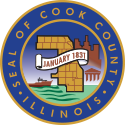New Solid Waste and Recycling Ordinance Gets County Board Approval
President Preckwinkle Applauds Outreach to Various Stakeholders
After months of collaboration and input from community and government organizations, the solid waste industry, and environmental advocacy groups, the Cook County Board Wednesday approved a Solid Waste and Recycling Ordinance (SWRO) that will give the County significant new tools to protect the environment.
The SWRO will grant Cook County the ability to increase recycling, prosecute fly-dumping and reduce the theft of metal and other valuable materials from public and private property. The ordinance supports recommendations from Cook County Board President Toni Preckwinkle’s Sustainability Advisory Council and the County’s Solid Waste Management Plan, which has set an aspirational goal of zero waste.
“We throw away too much and don’t recycle enough,” Preckwinkle said. “That has a significant impact on our community and exacerbates environmental issues such as illegal dumping and land and water pollution.”
Among the benefits for Cook County residents from passage of the ordinance are:
- Collection of comprehensive data, which does not now exist, on the volume of waste, how much is being recycled and what materials are in the waste stream. This data will allow the County to develop policies to address the barriers to increased recycling and reuse.
- More frequent inspections of landfills, and waste transfer stations. Despite high volumes of solid waste passing through many of these facilities, and the serious environmental problems that can result from waste, there is no local entity that regularly monitors them.
- Monitoring of recycling facilities, such as junk yards, scrap collectors, compost facilities, and large industrial recycling facilities. In suburban Cook County these facilities are not regularly checked by either state or federal authorities.
- The ability to respond quickly to complaints of toxics spills, fly dumping, vermin, odors and other environmental issues and to enforce safety and health standards by prosecuting violations.
- Requirements on recycling facilities that make it harder for thieves to sell stolen materials – which commonly include public property such as manhole covers, and private property such as chain-link fencing, wire, downspouts, and gutters.
The SWRO was introduced in September. In the months since then, President Preckwinkle tasked the County’s Department of Environmental Control and Chief Sustainability Officer with reaching out to numerous parties to solicit their opinions on the proposed ordinance.
Cook County Department of Environmental Control staff held a number of meetings with industry officials including representatives from the waste industry, scrappers and building material recycling associations. Dialogue over the ordinance also took place with councils of mayors in suburban Cook County and the Solid Waste Agency of Northern Cook County. Environmental groups which were brought into the conversation included the Sierra Club, the Southeast Environmental Task Force, the Illinois Environmental Council, the Environmental Law and Policy Center, the Chicago Recycling Coalition, Friends of the Forest Preserves, and others.
Ordinance amendments that resulted from the input provided by various organizations included:
- Delaying by a year the requirement for waste haulers to report waste and recycling figures for non-residential units, to allow time for the industry to put a process in place.
- Clarifying that a waste transfer facility is only responsible for litter associated with the operation of the site. Also clarified that individual transfer facilities are not responsible for violations trucks may have at other facilities.
- Excluding temporary municipal debris storage sites, such as those used to secure materials from sewer projects or tree trimmings, and publicly owned waste facilities.
- Simplifying vehicle record keeping, and reducing paperwork requirements on waste businesses.
“These changes make the ordinance stronger and more enforceable,” said Cook County Chief Sustainability Officer Deborah Stone. “In addition to working on issues with this ordinance, we have established stronger working relationships with organizations that will help our department with future outreach and enforcement. By adopting this ordinance, Cook County will further cement its standing as a leader in environmental and sustainability issues.”
Cook County plans to seek a delegation agreement with the Illinois Environmental Protection Agency that would allow it to regulate solid waste facilities and illegal dumping. The City of Chicago and 18 other Illinois counties – including Will, DuPage, Lake and McHenry – already have such delegation agreements. Fees attached to the ordinance will be kept in a specific fund which can be used only for solid waste and related environmental purposes, including recycling, as prescribed by state law.
The SWRO, was sponsored by President Preckwinkle and Commissioner Stanley Moore (4th), and co-sponsored by Commissioners Jerry Butler (3rd), John Daley (11th) and Gregg Goslin (14th).
“I am proud to sponsor this ordinance, which is supported by the Sierra Club, Illinois Environmental Council, and Southeast Environmental Task Force, among others,” Moore said. “Chicago and our neighboring counties have strong solid waste environmental protections and the residents of Cook County deserve no less.”
